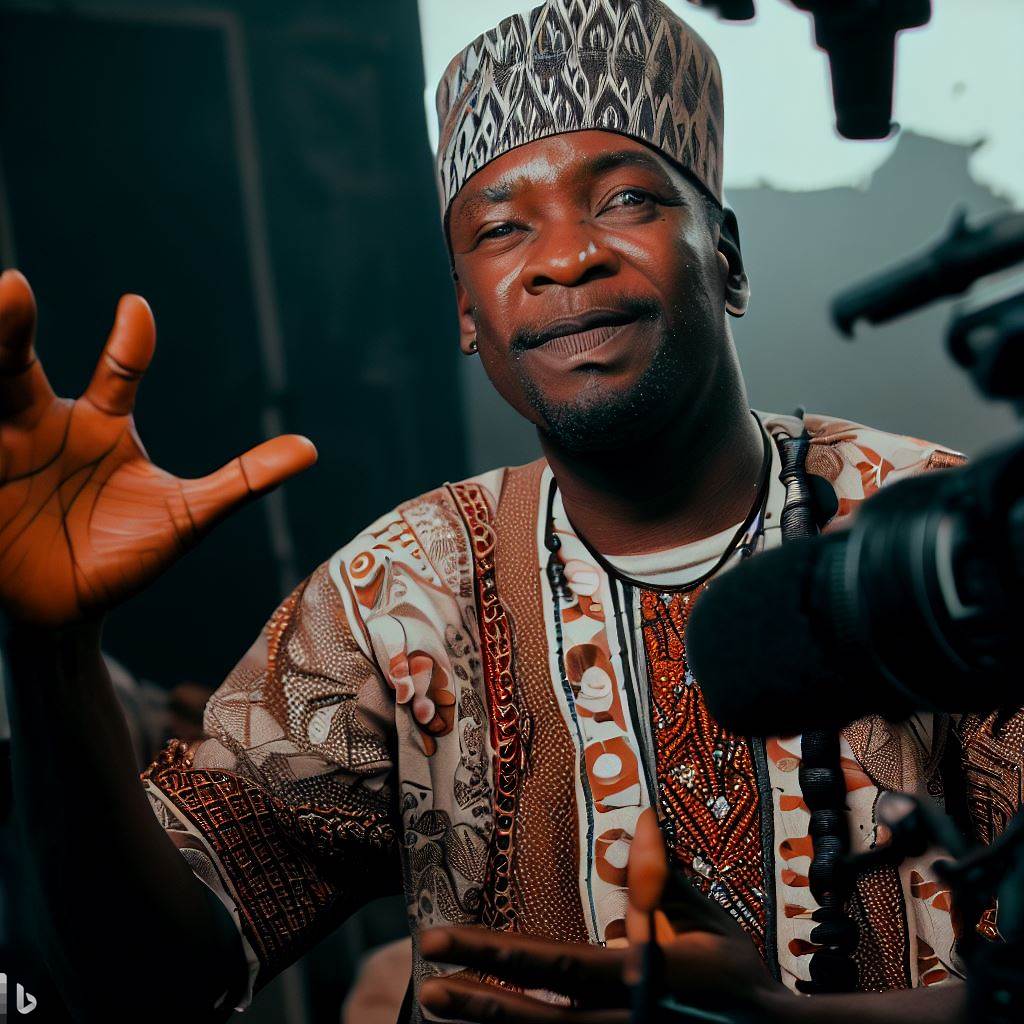Introduction
Music producers play a vital role in Nigeria’s music industry, making their importance and relevance undeniable.
They are responsible for creating and shaping the sound of musicians, ensuring high-quality music production.
To succeed in this field, proper education and training are crucial.
Music production requires technical skills, knowledge of music theory, and proficiency in using various equipment and software.
The Current State of Education and Training for Music Producers in Nigeria
When it comes to education and training for music producers in Nigeria, there are several existing institutions and programs that cater to aspiring producers.
However, these programs have their limitations and shortcomings that need to be addressed.
Existing educational institutions and programs
- University programs: Some universities in Nigeria offer courses in music production as part of their music or audio engineering degrees.
- Vocational schools: There are vocational schools that specialize in music production and offer hands-on training in various aspects of the field.
- Private training academies: Private academies provide short-term courses and workshops specifically tailored for music producers.
While these institutions provide a foundation for aspiring music producers, there are several limitations that hinder their effectiveness.
Limitations and shortcomings of existing programs
- Lack of comprehensive curriculum: Many of the existing programs have a limited curriculum that does not cover all the necessary skills and knowledge needed for music production.
- Inadequate resources: Some institutions lack the resources, such as state-of-the-art equipment and software, necessary to deliver high-quality education and training.
- Limited access: The availability of these programs is often restricted to major cities, making it difficult for aspiring producers from rural areas to pursue their dreams.
- Outdated teaching methods: Some programs employ outdated teaching methods that do not align with the rapidly evolving music production industry.
Shortcomings of the existing programs
Moreover, one of the major shortcomings of the existing programs is the lack of real-world experience and industry exposure.
Many of these programs do not provide sufficient opportunities for students to connect with working professionals or gain practical experience in the field of music production.
This lack of real-world experience often leaves graduates ill-prepared to enter the industry and succeed in their careers.
Music production is a field that requires a deep understanding of the industry’s dynamics and the ability to apply theoretical knowledge in practical scenarios.
To overcome these limitations and shortcomings, it is crucial to introduce a more comprehensive curriculum that covers all aspects of music production, including technical skills, industry knowledge, and entrepreneurship.
Additionally, institutions should strive to provide access to professional-grade equipment and software, regardless of geographical location.
Furthermore, incorporating internships, mentorship programs, and industry collaborations into the educational framework can bridge the gap between academia and the real world.
This would provide students with invaluable opportunities to learn from experienced professionals and gain hands-on experience in the music production industry.
In the end, while there are existing educational institutions and programs for music producers in Nigeria, there are significant limitations that need to be addressed.
The lack of comprehensive curriculum, real-world experience, and industry exposure hinder the effectiveness of these programs.
To enhance the education and training for music producers, it is essential to revamp the curriculum, provide access to resources, and foster industry connections.
Read: Traditional Elements in Modern Nigerian Music Production
The Role of Technology in Education and Training for Music Producers
In today’s digital age, advancements in technology have revolutionized the music production process, making it more accessible and efficient than ever before.
Transformation of the Music Production Process
- Technology has replaced traditional recording methods, allowing producers to create music in a digital environment.
- Digital audio workstations (DAWs) have become essential tools, enabling recording, editing, and mixing of music.
- Virtual instruments and software plugins offer a wide range of sounds and effects, expanding creative possibilities.
- Automatic tuning and time correction tools enhance the quality of recordings, saving time and effort.
- Online collaboration platforms enable music producers to work remotely with artists from different locations.
These technological advancements have streamlined the music production process, empowering producers to achieve professional results efficiently.
Importance of Technology-Driven Education and Training
- Music production education and training programs must adapt to technological advancements to equip aspiring producers with relevant skills.
- By incorporating technology-driven tools and techniques, students can learn industry-standard practices.
- Hands-on experience with DAWs, virtual instruments, and software plugins prepares students for real-world scenarios.
- Understanding digital workflows and techniques ensures efficiency and competitiveness in the music industry.
- Technology-driven education allows for continuous learning and adaptation to evolving trends and technologies.
Embracing technology in education and training programs empowers future music producers to thrive in the digital landscape.
Availability of Online Courses and Tutorials
- The internet offers a wealth of online courses and tutorials specifically designed for aspiring music producers.
- These courses cater to various levels of expertise, allowing beginners to advanced learners to benefit.
- Virtual classrooms and video tutorials provide interactive learning experiences, simulating real-world studio environments.
- Online platforms offer flexibility, enabling learners to study at their own pace and convenience.
- Access to online communities and forums fosters collaboration, networking, and sharing of knowledge.
Aspiring music producers in Nigeria can take advantage of these online resources to develop their skills and knowledge.
Technology plays a crucial role in education and training for music producers in Nigeria.
Advancements in technology have transformed the music production process, making it more accessible, efficient, and competitive.
By incorporating technology-driven tools and techniques, education and training programs ensure that aspiring music producers are equipped with the necessary skills to succeed in the digital landscape.
Furthermore, online courses and tutorials provide accessible resources for continuous learning and development.
As the music industry continues to evolve, embracing technology in education and training is essential for the growth and success of music producers.
Read: Making Beats: Software Choices of Top Nigerian Producers
Challenges Faced by Aspiring Music Producers in Nigeria
Financial Constraints and Lack of Resources
One of the major challenges faced by aspiring music producers in Nigeria is the financial constraints and lack of resources.
The cost of setting up a professional music production studio can be prohibitively high.
Acquiring high-quality equipment, software, and studio spaces requires a significant financial investment, which many aspiring producers cannot afford.
This lack of financial resources hinders their ability to produce and release high-quality music.
Limited Access to High-Quality Equipment, Software, and Studio Spaces
Another challenge is the limited access to high-quality equipment, software, and studio spaces.
In Nigeria, it can be difficult to find affordable and reputable suppliers of music production equipment.
Aspiring producers struggle to find the latest technologies and tools needed to produce professional-sounding music.
Additionally, the availability of well-equipped studio spaces is limited, making it challenging for producers to find suitable environments to work in.
Difficulty in Finding Experienced Mentors and Industry Professionals
Finding experienced mentors and industry professionals for guidance is another significant challenge for aspiring music producers in Nigeria.
Mentorship plays a crucial role in developing the necessary skills and knowledge needed to succeed in the music production industry.
However, there is a scarcity of experienced mentors willing to share their expertise and guide newcomers in the field.
This lack of guidance and mentorship opportunities makes it challenging for aspiring producers to refine their craft and gain industry insights.
In fact, aspiring music producers in Nigeria face several challenges that hinder their path to success.
The financial constraints and lack of resources make it difficult for them to invest in quality equipment and studio spaces.
Limited access to high-quality equipment and studio spaces further hampers their ability to produce professional-sounding music.
Additionally, the scarcity of experienced mentors and industry professionals leaves aspiring producers without proper guidance and mentorship.
Despite these challenges, it is important for aspiring music producers to persevere and seek opportunities to overcome these obstacles.
By leveraging online resources, networking, and continuously honing their skills, aspiring producers can navigate these challenges and make their mark in the Nigerian music industry.
Read: Music Producers and Talent Scouting in Nigeria: A Close Look

Initiatives and Solutions to Improve Education and Training for Music Producers in Nigeria
Education and training for music producers in Nigeria is essential for the growth and development of the music industry.
However, there are several challenges that need to be addressed in order to provide aspiring producers with quality education and training.
This blog section discusses the need for collaboration between
- Educational institutions, industry professionals, and the government
- The importance of creating specialized music production programs with comprehensive curriculums,
- The significance of providing scholarships and financial assistance to aspiring music producers.
Collaboration between Educational Institutions, Industry Professionals, and the Government
- Educational institutions, industry professionals, and the government need to collaborate to improve music production education in Nigeria.
- There should be partnerships between universities, colleges, music industry associations, and government agencies.
- Collaboration will ensure that educational programs align with industry needs and standards.
- Industry professionals can provide valuable insights, mentorship, and practical training opportunities to students.
- The government should support initiatives that promote music production education and create policies to regulate the industry.
Creating Specialized Music Production Programs with Comprehensive Curriculums
- Specialized music production programs need to be developed to cater to the specific needs of aspiring producers.
- Curriculums should cover a wide range of topics including music theory, technology, audio engineering, and business skills.
- Hands-on training and practical experience should be incorporated into the programs.
- Industry professionals should be involved in designing the curriculums to ensure relevance and up-to-date knowledge.
- Continuous evaluation and improvement of the programs should be carried out to meet industry demands.
Providing Scholarships and Financial Assistance
- Scholarships and financial assistance programs are crucial to enable talented individuals to pursue music production education.
- Financial barriers should not hinder aspiring producers from accessing quality education and training.
- Music industry associations, private organizations, and the government could provide scholarships and grants.
- Sponsorship from established producers and music companies can also play a significant role in providing financial support.
- Creating a transparent and fair selection process for scholarships will ensure deserving individuals benefit.
In a nutshell, improving education and training for music producers in Nigeria requires collaborative efforts from educational institutions, industry professionals, and the government.
Creating specialized programs with comprehensive curriculums and providing scholarships and financial assistance are essential steps towards nurturing and developing talented music producers.
By addressing these initiatives and solutions, Nigeria can foster a vibrant and thriving music industry.
Read: In-Depth Analysis: The Nigerian Music Producer’s Workspace
Success Stories and Role Models in the Nigerian Music Production Industry
In Nigeria, the music production industry has experienced significant growth over the years.
This growth can be attributed to the hard work and achievements of notable Nigerian music producers who have thrived despite the challenges they faced.
The Journey of Sarz
Sarz, whose real name is Osabuohien Osaretin, is a renowned Nigerian music producer who started his career at a young age.
Despite coming from a non-musical background, Sarz’s passion for music led him to pursue his dreams diligently.
He began by making beats for free, which eventually caught the attention of prominent Nigerian artists.
Through consistent hard work and dedication, Sarz has produced hit songs for superstars like Wizkid, Davido, and Burna Boy.
Achievements and Contributions of Sarz
Sarz’s talent and unique sound have earned him numerous accolades.
He won the “Best New Producer” category at the Nigerian Entertainment Awards in 2012 and has also been nominated for several other awards.
His contribution to the Nigerian music industry goes beyond his award-winning productions.
Sarz has played a significant role in shaping the sound of Afrobeat music and has become a major influence on producers both in Nigeria and internationally.
The Success Story of Kiddominant
Kiddominant, also known as Ayoola Oladapo Agboola, is another Nigerian music producer who has achieved remarkable success.
His passion for music production began at a young age, and he honed his skills through persistent practice.
Kiddominant rose to prominence after producing the hit song “Fall” by Davido, which gained international recognition and topped various music charts.
Since then, he has worked with several renowned artists, including Chris Brown.
Contributions and Impact of Kiddominant
Through his exceptional talent and dedication, Kiddominant has contributed to the growth of the Nigerian music industry.
His unique productions have helped internationalize Afrobeat music, bridging the gap between Nigerian artists and the global music scene.
Kiddominant’s success story serves as motivation for aspiring music producers, showing them that with hard work and perseverance, it is possible to achieve greatness in the industry.
The Importance of Learning from Role Models
These success stories of Sarz and Kiddominant highlight the importance of learning from experienced and accomplished individuals in the music production industry.
By studying the journeys, accomplishments, and contributions of role models like Sarz and Kiddominant, aspiring music producers can gain valuable insights and inspiration.
They can learn from their techniques, work ethics, and the strategies they used to overcome challenges.
Role models serve as a source of mentorship and guidance, offering valuable lessons that can significantly enhance the skills and knowledge of upcoming music producers.
Learning from their experiences can also help aspiring producers to navigate the industry more effectively and increase their chances of success.
In general, the success stories of music producers like Sarz and Kiddominant demonstrate that despite the challenges, it is possible to achieve greatness in the Nigerian music production industry.
Aspiring producers should take inspiration from their journeys, learn from their accomplishments, and use their experiences as a guide to excel in their own careers.
Conclusion
Proper education and training are crucial for music producers in Nigeria. By acquiring the necessary knowledge and skills, music producers can thrive in this industry.
There is immense potential for growth and numerous opportunities in the music production field.
With the increasing demand for music in various industries, music producers can establish successful careers.
Aspiring music producers should actively seek out educational resources, such as courses and workshops.
Additionally, mentorship from experienced producers can provide valuable guidance and support. Networking with professionals in the music industry can lead to collaborations and career advancements.
By investing in education, mentorship, and networking, aspiring music producers can position themselves for success.
Overall, the path to becoming a successful music producer in Nigeria lies in continuous learning and building connections.
With the right education and a strong network, aspiring producers can achieve their goals and contribute to the vibrant music scene in Nigeria.
Publish Your Professional Profile, Business or Brand
Showcase your expertise, gain trust, and boost visibility instantly on Professions.ng.
Publish Now



